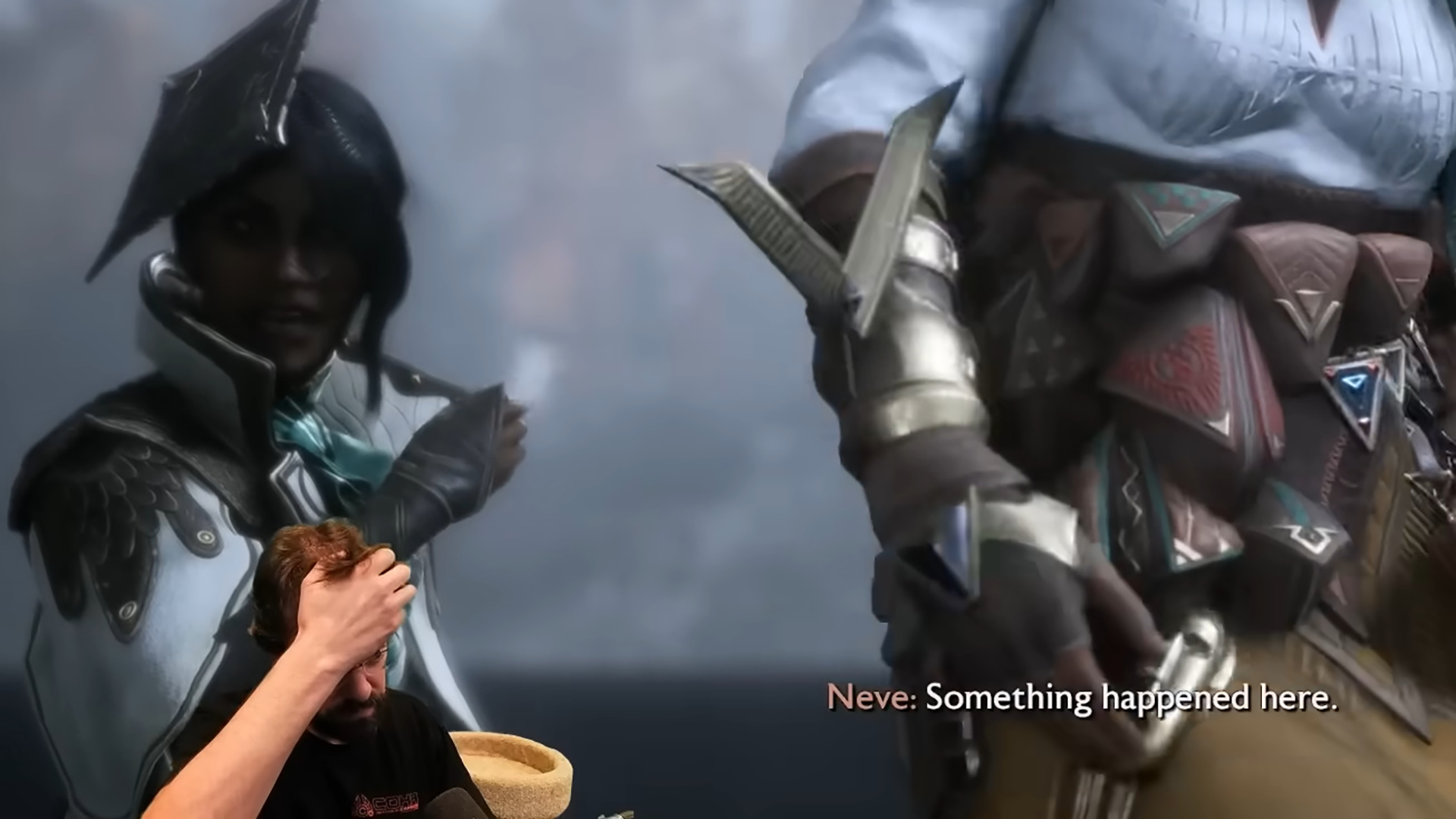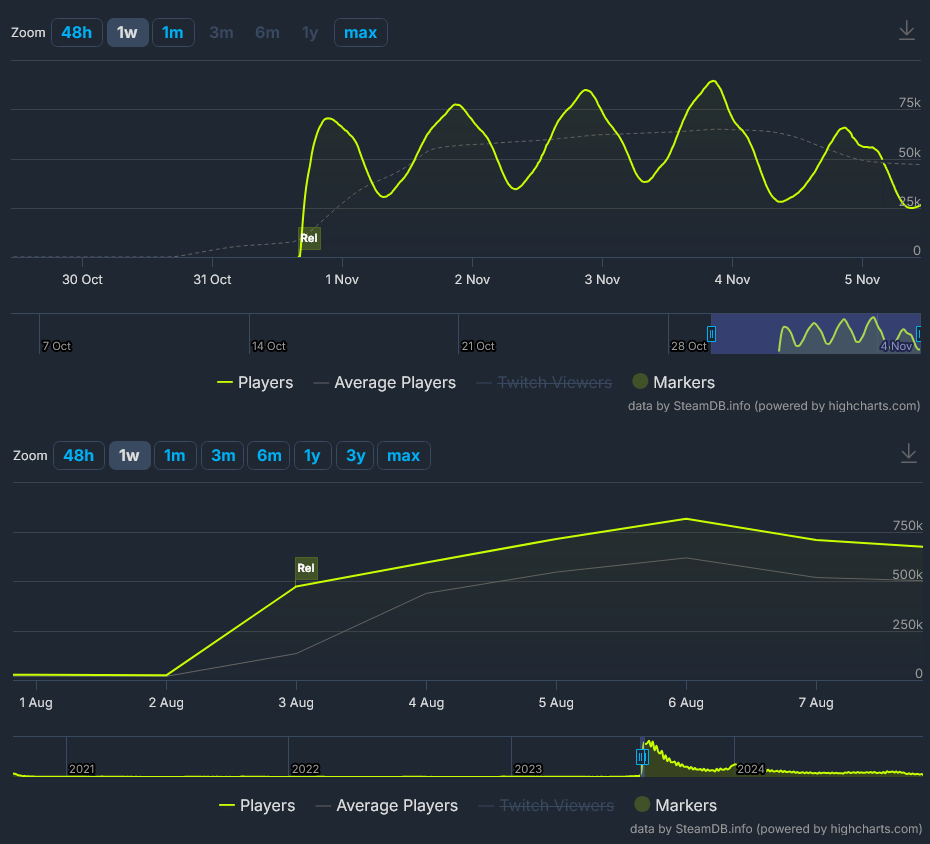The Dichotomy of Dragon Age: The Veilguard Opinion
Is Dragon Age: The Veilguard a good game, as the gaming press seems to think, or is it as bad as popular opinion on the internet would suggest?

Streamer CohhCarnage marvelling at just how bad The Veilguard's writing is (Screenshot: CohhCarnage, Electronic Arts / Bioware)
Reviews of Dragon Age: The Veilguard at legacy gaming publications have overwhelmingly been largely positive. This stands in stark contrast to a lot of player reviews on Steam and the popular opinion that is apparent in many other communities where gaming enthusiasts gather. This blog post is my attempt to merge these two wildly diverging viewpoints by explaining how they came about and by presenting my thoughts on why one opinion is a lot more valid than the other.
Bias of the Professional Reviewer
After watching several hours of gameplay by a number of streamers, it became quite obvious to me why most of the legacy gaming press gave The Veilguard such high marks. It looks great. The combat mechanics seem to be entertaining. And there’s a lot of game to be had. When looking at video games through a somewhat detached, clinical perspective — as most of these writers are, unfortunately, trained to do — you could get the idea that this game delivers everything that gamers want. And on top of that, it is very stable and pretty optimised, somewhat of a rarity when it comes to modern AAA titles.
Most of these writers probably haven’t played previous Dragon Age games — certainly not Dragon Age: Origins or Dragon Age II — seeing as it’s been a decade since the most recent one was released. And with their employers being as stingy as they are, they’re not given the time and resources — as they should be if they’re expected to hand in quality work — to go back and play at least one of the beloved classics before reviewing the newest entry in the series. Had they done so, or had these reviews been written by veteran gamers, who actually played these games back in the day, the reviewers would have realised something that a large part of the intended audience of their writing did.
Because here is the crux of the matter. Even the most positive reviews of The Veilguard noted two weaknesses of the game: One was its linearity and the lack of areas to explore aside from the path that the main story proceeds along as if on rails. And the other, more serious, problem with the game, that was mentioned in every review I’ve read, was the extremely weak dialogue. Pretty much all of the legacy publications dinged the game’s score for these shortcomings, but they otherwise praised it for its strengths and then proceeded to even the final rating out to something that made the game look like it’s pretty fun and well worth €60. And this is where these reviewers went wrong. Their bias towards what they probably think is an objective view of video games — but in reality is way too clinical and too far removed from the viewpoint of their audience — and the fact that they don’t get enough time to put proper care into involved and complicated reviews like this, lead them astray to miss the most important point here.
It’s All Rather Obvious, Really
Meanwhile, a large part of their audience — pretty much any fan of the Dragon Age series who wasn’t blinded by marketing and hope or spends their days hooked up to a massive copium tank — figured out the rather large elephant in the room. In a narrative RPG, dialogue and the ability to explore the game world at your own pace are two of the most important aspects of the game! Therefore, what most professional reviewers saw as just two random downsides on a bullet point list of features to work through, any gamer worth their salt would immediately identify as a fatal flaw for any serious RPG. Especially one built on a legacy of engaging stories, interesting characters and the ability for players to affect the game world and the outcome of these stories meaningfully through their decisions.
In a narrative RPG, dialogue and the ability to explore the game world at your own pace are two of the most important aspects of the game! Therefore, what most professional reviewers saw as just two random downsides on a bullet point list of features to work through, any gamer worth their salt would immediately identify as a fatal flaw for any serious RPG.
Dragon Age: The Veilguard may be a good game for casual players looking for a good action game romp in the vein of, lets say, the God of War series, but it is a horrible Dragon Age game. Its two main weaknesses are exactly what the series has been built upon until now. And thus it fails to be what most players drawn to the title expect and want from the game. But, of course, you would have to understand Dragon Age games to know that and, sadly, professional reviewers who review Dragon Age games these days obviously don’t understand what they are reviewing.
It doesn’t really matter what EA, and these journalists working at legacy publications, think. They might be of the opinion that it is a good idea for Dragon Age to branch out into new markets and get more players by sacrificing everything that made this game series what it is today. It doesn’t matter, because they are wrong. When you are reviewing the fourth instalment of a game series, you can’t judge that game in a vacuum, like most of these reviewers obviously did. You need to compare and contrast with the games that preceded it and made the series successful in the first place. If you don’t do that, you fail your audience and you will fail to understand why such games don’t do as well as you probably expected.
People fall in love with games like Dragon Age: Origins, or Baldur’s Gate 3 for that matter, because they specifically don’t want another brainless action game that is basically a interactive MCU movie. People loved the old Dragon Age games, because they let you explore in your own time. Because the dialogue made the characters believable and the stories engaging. Hell, Dragon Age II is one of the most boring looking games of its generation, yet it is probably still in the my top ten list of the greatest video games ever, simply because its writing was so engaging. And EA sought to replace this stuff with cardboard cut-out characters that either bore you to tears or lecture you on social issues using wildly out of place post-modern vocabulary in a high fantasy setting? How can you not realise how stupid this approach is?
I Don’t Understand These People
Gamers play fantasy RPGs to lose themselves completely in the worlds they conjure. The previous three Dragon Age games did this by creating a gritty dark fantasy world populated by disgusting monsters and very interesting people. These games did this by having well written dialogue, gory fight scenes and letting the player make high stakes decisions that could sometimes condemn companions, or even your own player character, to a gruesome death. Every person in the world, including the protagonist, had a dark side and some emotional baggage or ongoing problems. This is what made those games both critical and financial successes. The Veilguard has none of this. It’s a bland, sterilised, railroaded action game plagued by terrible writing and a visual aesthetic that makes it just about unrecognisable to any Dragon Age fan who waited ten years for the next instalment of this beloved series.
I could go on about other things most legacy gaming outlets missed — like how the new combat system in this game desperately wants to be Elden Ring, while at the same time totally missing the fact that the one thing that makes Elden Ring’s combat so engaging is that it is, above all, hard — but what would be the point? The dialogue and storytelling is the main thing that breaks this game and I honestly find it hard to understand how Bioware could have thought it would be a good idea to gut its own franchisee this way. If they wanted a more action-oriented series for more casual players, why didn’t they simply make a new one? Why destroy a successful series for something people don’t particularly seem to want right now? With a $250 million budget, was there simply no money left to pay some good writers?
I feel that I kind of understand why journalists are this blind, because I understand the particular pressures of the job, but then, maybe I am deluding myself here in assuming an honest mistake on their part. The more suspicious, ironically more journalistic, aspect of my mind looks at how most of these outlets also reported that The Veilguard broke all sales records for EA on Steam and thinks that this must be intentionally malicious propaganda. No games journalist could possibly be that dumb, right? While reporting this factoid is obviously technically correct, it’s also clearly misleading since, as these people surely know, The Veilguard is EA’s first proper release on Steam in 13 years. EA left the platform in 2011, which was well publicised by these outlets at the time. So, naturally, this release would break sales records simply by being EA’s first actual release on Steam in the current era of AAA games.
In reality, EA spent over $250 million on a game that peaked at under 90,000 concurrent players on Steam. In comparison, Larian’s Baldur’s Gate 3, a direct competitor, had over 875,000 players on Steam when it came out and cost less than half of what EA spent on The Veilguard. In fact, Baldur’s Gate 3, which is now more than a year old, has more players playing it right now than EA’s supposedly very successful new Dragon Age title. Hell, Elden Ring is coming up on its third birthday and it still has half the player base The Veilguard has in its release week.

The Veilguard's release on Steam (above) compared to Baldur's Gate 3 when it released in 2023 (below). Baldur's Gate 3 did roughly ten times as well initially and retained players much better. (Data from SteamDB)
It’s obvious that EA and Bioware made a misstep in doing what they did to a beloved franchise. And I think they know it, which is probably why they have no plans for any DLC. Most gamers don’t want a railroaded story and brainless action. And they don’t want to get preached at incessantly by characters seemingly designed by a DEI committee. They want well-written characters and stories that challenge them. They want their games to be clever, intelligent and punishing, not with sanded-off corners, fake inclusion and features simply designed to tick off a box in some middle manager’s spreadsheet.
From Software’s Elden Ring and Larian’s Baldur’s Gate 3 showed us that. EA and Bioware failed to listen and will pay the price. Despite a legacy gaming press that is constantly, in its ignorance, helping them make these mistakes instead of calling them out. Because with all the money these companies have to throw at propaganda, it turns out that gamers aren’t as dumb as marketing people and journalists seem to think.
